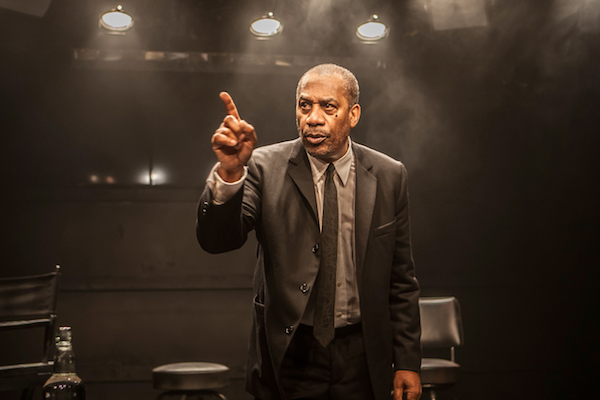
BY ANDY HUMM | “Nigger!” That’s what I shouted at Dick Gregory at his insistence. And he replied, “Thank you, white man in the mustache. You just made me 50 bucks.”
To see how such an audacious “joke” works, you have to go see Joe Morton’s epic and bitingly funny portrayal, in Gretchen Law’s “Turn Me Loose,” of the groundbreaking ‘60s comedian and race man Gregory who is still with us at 83 — and still making us laugh and think and trying to get us to eat right.
Gregory fearlessly found a way a way to get America to see its racism and still be deeply entertained at a time when (Lenny Bruce notwithstanding) mother-in-law jokes were still in vogue. He played venues from the Playboy Club to college campuses. I heard him at the University of Virginia in ’72 when he was on a hunger strike over the Vietnam War — another life-and-death cause he was able to mine for humor.
Morton, himself a 40-year star of stage (“Hair,” “Raisin”) and screen (“Brother from Another Planet,” TV’s “Scandal”), takes us, in 90 minutes, on Gregory’s journey from poor St. Louis childhood to college track star to the Army to a career in comedy launched in Chicago in the late 1950s. He quickly embraced an equally intense commitment to the Civil Rights Movement, working closely with Medgar Evers in 1963 in Mississippi immediately before his assassination in his own driveway.
Morton’s rendering of these harrowing moments in Gregory’s life and the life of the movement are spine-tingling, especially how the death of his son in 1963 saved his own life.
In an almost entirely one-man show save for ancillary roles played by John Carlin, Morton weaves comedy routines with commentaries on his career and race work — as well as analysis of what ailed America and still does. As we all cope with these unbelievably unsettling times, I can’t think of a better show to put it all in perspective. (The name Trump is not spoken, but hovers nevertheless.) “We didn’t die during the Civil Rights Movement so that we could elect a black president,” he says. “We died to save the least among us.”
The most riveting scene has Gregory in his dressing room getting a call from NBC’s “Tonight” show in the early 1960s — every comedian’s dream. The struggle that he goes through with the show’s booker, host Jack Paar, and himself as he tries to balance his ambition with his need for self-respect is unforgettable. “I can make a white man laugh about anything I want him to!,” he says to his mirror as he debates with himself. “I can make him beg me to make him feel bad. Just with a joke.”
Dick Gregory himself is still at it — and has been known to make comments on gay issues that are less than politically correct. This show does not get into that. But in its laser focus on race, it confronts us with who we are as Americans — a culture that still imbues the n-word with a terrible sting. That is something “Turn Me Loose” — and Dick Gregory — are still trying to defuse.
TURN ME LOOSE: A PLAY ABOUT COMIC GENIUS DICK GREGORY | Westside Theatre, 407 W. 43rd St. | Through Jul. 3: Tue.-Thu. at 7:30 p.m.; Fri.-Sat. at 8 p.m.; Wed., Sat.-Sun. at 2 p.m. | $79 at turnmelooseplay.com or 212-239-6200 | Ninety mins.






























